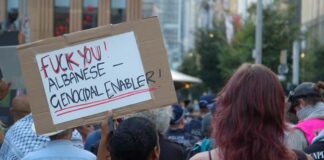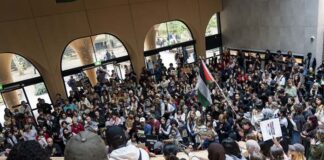Israel’s determination to build settlements on occupied Palestinian territory is worrying the US government. John Rose answers questions on the US-Israel relationship
What is the historic relationship between the US and Israel?
Ha’aretz, Israel’s main liberal newspaper, explained in 1951 that, “Israel is to become the watchdog”.
Israel could only survive by demonstrating its usefulness to the West. It could not have been founded without Western imperial power.
At first, France was as important to Israel as the US. It was France that gave Israel its nuclear technology.
But the relationship with the US really became important after the 1967 war, when Israel demonstrated its military capacity by defeating the Egyptian, Syrian and Jordanian armies.
The flow of funds from the US to Israel afterwards went up ten times.
Does that mean that the US effectively controls Israel?
I am Jewish, but became an anti-Zionist—opposed to the state of Israel—during the 1967 war. I learnt that you could see Israel as an attack dog with an American master.
So the US has Israel on a leash. But sometimes the dog can pull the owner—it can take them down alleys they don’t want to go.
Israel has become more and more aggressive over the years. Now it has reached a point where it is almost completely out of control, which is why we’ve seen for the first time such an open intervention by the Pentagon.
The Pentagon effectively told Barack Obama, “You’ve got to cool these guys.” General David Petraeus, who is in charge of US operations in Afghanistan, said, “Israel is risking American soldiers’ lives.”
Does this represent a shift in relations between the US and Israel?
There’s increased tension, but I don’t think there’s been a real shift. And this hasn’t just happened under Obama.
Israel went into Gaza, quite cunningly, between the presidencies. They got out just before Obama was inaugurated. So it was George Bush’s administration that was taking the hits as Israel went berserk.
But the pressure from the Turkish government was interesting. Turkey signed a peace pact with Israel under US supervision in the 1950s.
Relations between Israel and Turkey had been really close. But at that point they were close to breaking down. That was deeply disturbing to the Americans.
Israel had been the key to stability in the region for the US. But now, to a degree, it was becoming a destabiliser. The problem for the US was managing that—which they’re trying to do at the moment.
Can the US draw in the leash without causing a huge fight?
Israel can be contained—but there are real tensions.
Its prime minister, Benyamin Netanyahu, clearly thought he could go to AIPAC—the Israel lobby in the US—and use it to bounce Obama into position. The opposite happened—it just infuriated the White House even more.
They’re trying to manage these tensions. As we speak, it’s not at all clear that they’re going to succeed. The US has to get a freeze on Israeli settlements in Palestinian territories, one way or another.
Why do you think the US is so keen to do that?
It has to curb Israel’s aggression. It has to find a way to keep Israel in its useful ally role instead of it going completely over the top.
US power in the region is not just about Israel—it’s also about compliant Arab states, especially Egypt, Saudi Arabia and Jordan. They are all dictatorships, threatened by their populations.
The Arab in the street is sick to death of what’s happening in Palestine.
With satellite TV, they’re getting more accurate reporting about what’s happening than we get in the West, and that’s certainly a destabiliser for the Arab regimes. Obama has had to take that into account.
What does the US want?
It now wants Israel to accept some kind of deal with the Palestinians that makes it possible for the Arab leaderships to say they’ve got something out of this.
Some halfway house solution would be a considerable advance for the Palestinians compared to what they have at the moment. But it falls far short of their legitimate national liberation aspirations.
In the end, the US can yank Israel’s lead. But no one knows how it’s going to play out.
Obama would prefer not to put that pressure on in public, but in the end it will be put on somehow.
Socialist Worker UK





